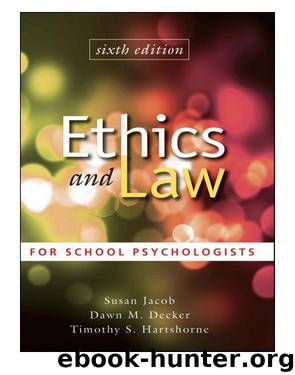Ethics and Law for School Psychologists by Hartshorne Timothy S. Jacob Susan Decker Dawn M. & Decker Dawn M. & Hartshorne Timothy S

Author:Hartshorne , Timothy S., Jacob, Susan, Decker , Dawn M. & Decker , Dawn M. & Hartshorne , Timothy S.
Language: eng
Format: epub
Publisher: John Wiley & Sons, Inc.
Published: 2010-10-17T16:00:00+00:00
Selection of Interventions Considerable research support exists for the practice of selecting behavioral interventions based on a systematic evaluation of the function a problem behavior serves for the child (Tilly, Knoster, & Ikeda, 2000). Two assessment methodologies have been developed to assist in identifying the functions served by a behavior. Functional assessment is based on naturalistic observations and involves direct observation and the use of informants (e.g., teacher interviews and rating scales) to gather information. Functional analysis involves controlled observation; that is, the factors that are believed to maintain the behavior are experimentally manipulated (Martens, Witt, Daly, & Vollmer, 1999). Both assessment strategies allow evaluation of the child and the environmental factors associated with the problem behavior, including examination of the setting events, antecedents, and consequences of behavior (also see Steege & Watson, 2008).
As noted previously, school psychologists are obligated ethically to select (or assist in the selection of) change procedures that have demonstrated effectiveness (NASP-PPE II.3.9). Consistent with the least restrictive alternative doctrine that evolved from court decisions (e.g., Wyatt v. Stickney, 1971) and the broad ethical principle of nonmaleficence, practitioners are obligated to select the least drastic procedures and those that minimize the risk of adverse side effects and also are likely to be effective. The literature reflects some consensus about the acceptability of various behavior-change procedures. First-choice strategies are positive behavioral interventions typically based on differential reinforcement (reinforcing appropriate behaviors incompatible with problem behaviors). Second-choice strategies are based on extinction (withdrawing of reinforcement for undesired behavior). Third-choice strategies include removal of desirable stimuli (e.g., time-out procedures). The least acceptable strategies are those that involve presentation of aversive stimuli (BACB, 2004; Repp & Singh, 1990).
Under IDEA, if a child’s behavior impedes his or her learning or that of others, the individualized education plan (IEP) team is required to consider “the use of positive behavioral interventions and support, and other strategies to address that behavior” in developing the IEP (34 C.F.R. § 300.324[a][2][i]). It is important for school psychologists to ensure that a functional behavioral assessment is conducted and to assist in the development of a behavior intervention plan when such strategies are essential to the provision of quality early intervening services or to the development of a student’s IEP or 504 plan (e.g., Denita Harris v. District of Columbia, 2008). In addition, functional behavioral assessment and intervention services are required following a disciplinary infraction that was determined to be a manifestation of the student’s disability (34 C.F.R. § 300.530[d][ii]).
In the 1970s, a number of behavioral control or change procedures came under the scrutiny of the courts. These early cases concerned youth in juvenile correction facilities (e.g., Morales v. Turman, 1974; Pena v. New York State Division for Youth, 1976) or residential mental health facilities (e.g., New York State Association for Retarded Children v. Carey, 1975) and provided some insight into the minimal standards that must be adhered to in the use of behavioral methods so as not to violate the constitutional rights of the children involved. More specifically,
Download
This site does not store any files on its server. We only index and link to content provided by other sites. Please contact the content providers to delete copyright contents if any and email us, we'll remove relevant links or contents immediately.
| Administration | Assessment |
| Educational Psychology | Experimental Methods |
| History | Language Experience Approach |
| Philosophy & Social Aspects | Reform & Policy |
| Research |
The Art of Coaching Workbook by Elena Aguilar(48065)
Trainspotting by Irvine Welsh(20055)
Twilight of the Idols With the Antichrist and Ecce Homo by Friedrich Nietzsche(17705)
Fangirl by Rainbow Rowell(7834)
Periodization Training for Sports by Tudor Bompa(7328)
Change Your Questions, Change Your Life by Marilee Adams(6641)
This Is How You Lose Her by Junot Diaz(5772)
Grit by Angela Duckworth(4737)
Red Sparrow by Jason Matthews(4666)
Asking the Right Questions: A Guide to Critical Thinking by M. Neil Browne & Stuart M. Keeley(4574)
Paper Towns by Green John(4169)
Room 212 by Kate Stewart(4107)
Ken Follett - World without end by Ken Follett(3972)
The Sports Rules Book by Human Kinetics(3588)
Housekeeping by Marilynne Robinson(3401)
The Motorcycle Diaries by Ernesto Che Guevara(3332)
Introduction to Kinesiology by Shirl J. Hoffman(3301)
Exercise Technique Manual for Resistance Training by National Strength & Conditioning Association(3292)
Double Down (Diary of a Wimpy Kid Book 11) by Jeff Kinney(3272)
